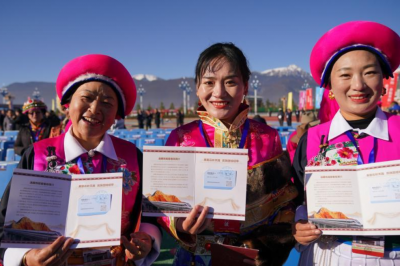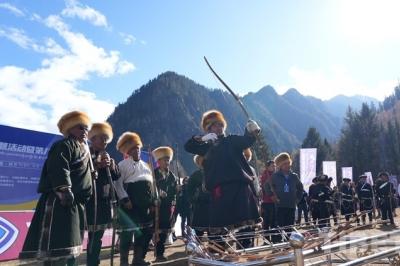|
Oct. 12, 2017 -- A Milky Way arch over Kangrinboqe Peak. The peak is said to be the center of the world in Buddhism. [Photo/Xinhua] It brought back childhood memories of lying in his grandma's arms looking at stars over the wheat fields in his hometown in East China's Shandong province. "In my hometown, economic growth has improved living standards, but brought serious pollution. It's hard to see stars there now." He began driving to dark places on clear nights to enjoy the splendor of the stars and had the idea to add astronomical aspects to his tours. "If tourists from economically developed regions enjoy the starry nights of Tibet, that's great." He teaches the tourists how to recognize the constellations, take photos of the Milky Way, and tells the stories behind the stars. He and his partners also run a small astronomy-themed hotel in Lhasa, capital of Tibet. Guests can observe the moon and planets through telescopes on the roof terrace. Kou Wen, a senior engineer with the Beijing Planetarium, helped Xiao Bei to promote astronomy activities in Tibet. He says Tibet, with its high altitude, beautiful scenery, lack of air and light pollution, is an international attraction for stargazers. As Chinese become richer and can afford high-end cameras and astronomical equipment, stargazing has grown in popularity, Kou says. Traditionally, only high-ranking monks in Tibet were qualified to study astronomy. They believed that celestial bodies had mysterious influences on the earth. These were revealed through observing the stars. Xiao Bei's activities also attract ordinary Tibetans. Once he set up a telescope near his home and was soon surrounded by dozens of people who were surprised to see the moon through the telescope. Fascination with the stars is universal. At the end of 2016, Xiao Bei accompanied a British documentary crew to shoot the night sky at Yamdrok Lake. The freezing cold made the British crew stamp their feet. But when a meteor flew overhead, they all jumped and gasped with joy. Hong Kong resident Stanley Chow and his wife, carrying a lot of photographic and astronomical equipment, come to Tibet to photograph the Milky Way. "In Hong Kong, we cannot see so many stars," Chow says. Deng Junjie, a college student from South China's Guangdong province, suffered from altitude sickness on arriving in Tibet. But when he saw the countless stars in Ngari, he says, he felt his soul was cleansed. Xiao Bei says stargazing, and recognizing the size of the universe, has calmed his irritable personality and made him want to learn more. In poverty-stricken Ngari Prefecture, a dark sky park has been set up to protect the night sky for stargazers. |
- Home
- News |Tibet |Exclusive |China |World |Related News |Latest
- Documents |White Papers |Others
- Photo |Politics |Economy & Society |Culture & Religion |Human & Nature |Beautiful Tibet |Other Tibetan-Inhabited Area |Exchanges |Related
- Video |News |Documentary |Micro-Video |Entertainment
- Art
- Tourism
- In Focus
- About Tibet







